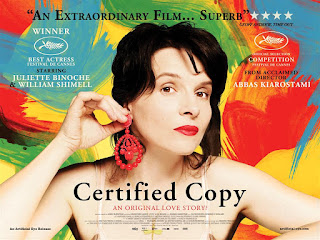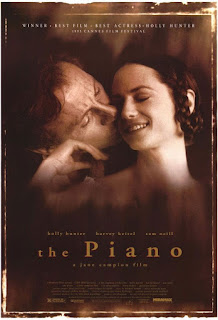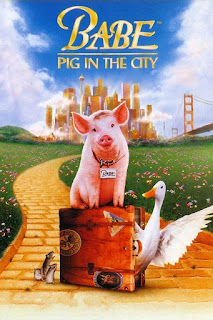July 20th: CERTIFIED COPY (Abbas Kiarostami, 2010)
A woman attends a literary event with the author present, and when the two meet later for a private excursion, the nature of their relationship and possible past together grows murkier.
Abbas Kiarostami was born in Tehran, Iran, and worked as a designer in advertising throughout the 1960s, then helped to develop the country's first educational film program, which released shorts and features by various directors. After his first feature The Report (1977) and the Iranian Revolution, Kiarostami continued his filmmaking uninterrupted by the new theocratic government.
The quasi-documentary Close Up (1990) greatly expanded Kiarostami's reputation on the international stage, drawing praise from various fellow filmmakers including Martin Scorsese, Jean-Luc Godard, Werner Herzog, and Quentin Tarantino. His third decade of work culminated in winning the top prize at the Cannes Film Festival for 1997's Taste of Cherry. Around this time Kiatostami became friends with French actress Juliette Binoche, and the two briefly collaborated on the director's experimental film Shirin (2008).
Kiarostami began work on a new project inspired by a (possibly personal) story he had previously relayed to Binoche, as well as the actress's reaction to the story. Binoche requested to play the lead role, which was developed specifically for her. Collaborating with Kiatostami on the script was French writer and psychologist Caroline Eliacheff, who had worked on various projects with New Wave director Claude Chabrol.
The film took years to commence production, mainly due to the trouble of finding a suitable male lead, with various notable actors attached and then passed over. After directing an opera for a French festival, Kiarostami offered the role to British opera singer William Shimell, who had never acted on camera before. Additional roles were played by the film's Italian producer Angelo Barbagallo and legendary French screenwriter Jean-Claude Carriere (Belle de Jour, The Unbearable Lightness of Being), in keeping with the director's tendency to use non-actors.
The chosen location for the story was the Tuscany region of Italy, with an all-Italian crew. This would mark the first time Kiarostami had made a feature outside his home country, with the exception of a documentary shot in Africa. Also new for the director was the use of a big name like Binoche, who managed to subsume herself to the director's particular laid-back approach, with modifications made to the characters and script as filming and Kiarostami's daily editing progressed.
The film premiered at the Cannes Film Festival, where Binoche won the Best Actress award for her work. She used her speech to protest the absence of Kiarostami's fellow Iranian director Jafar Panahi, who was imprisoned by the Iranian government and had to decline the invitation to be on that year's jury. The critical reception was mostly positive, with the film doing considerable arthouse business. It was banned in Iran for being made outside the country and for featuring Binoche's western attire on camera.
Running time is approx. 100 minutes.










Comments
Post a Comment